Between 1978 and 1991, Jeffrey Dahmer committed the shocking murders of seventeen men, involving necrophilia, dismemberment, cannibalism, and the preservation of the victims’ body parts. After years of law enforcement and the public ignoring the many signs that could have led to his earlier capture, he was ultimately found “guilty but sane” in 1992, and condemned to multiple life sentences (then was beaten to death by a fellow inmate in 1994). Philadelphia’s Going Dark Theatre brings the serial killer’s chilling story to in Hammonton, NJ, with The Confession of Jeffrey Dahmer, presented at the Eagle Theatre in this year’s second annual New Jersey Fringe Festival.
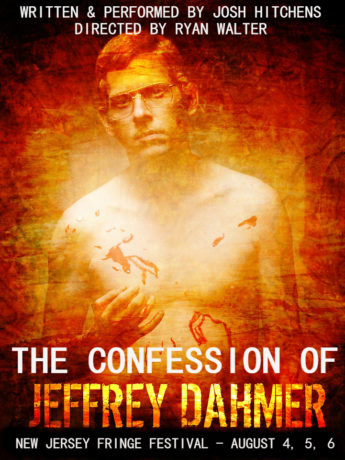
Written and performed by Josh Hitchens and directed by Ryan Walter, the tour-de-force solo show (which I reviewed in BrainSpunk’s blood-curdling production of 2015) not only takes us into the disturbed mind of Dahmer, but also relates the backstory of his troubled childhood and gives a warning about the need for intervention before it’s too late, leaving us with the critical message: If you see something, do something.
I spoke with Hitchens and Walter prior to their appearance in the Jersey Fringe, to discuss the play, their interest in Dahmer’s story, and what they hope to accomplish in telling it.
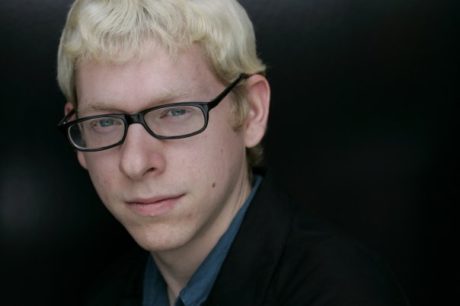
Deb: What made you decide to create a play about Jeffrey Dahmer, a notorious mass murderer?
Josh: I started working on it about thirteen years ago, in a college playwriting class. He seemed different to me than some of the other serial killers, in that he didn’t take sadistic joy in the murders; it was his loneliness that led him to do this. Otherwise he seemed normal – and maybe even a little boring – from all outside appearances. Yet he did horrific things that are almost beyond imagining. So I wanted to learn more about him and what it was that made him do it. I wanted to get as close to the truth as possible.
Ryan: The main reason for me to get involved with this was because Josh asked me. He was the first director I worked with in Philadelphia, when we did Macbeth together at the old Shubin Theatre. About three years ago he approached me to direct his new play; I read it and fell in love with it. I’m not really a horror fan, but I saw in this script such a human story and the important question of how do you find the human being in the monster? In conjunction with this show, we want to collect donations for organizations that address these kinds of issues and help people in pain, those who have been marginalized. That’s what causes this behavior, so we need to be aware and to alleviate the suffering. If someone had paid attention to Dahmer, he could have been stopped from doing what he did. There were so many missed opportunities, and so much apathy. I encourage everyone who comes to the show to give anything they can, to help the people who need it. The donations we collect during this run will be given to The Attic Youth Center, an organization in Philadelphia that we’re familiar with, which does good work.
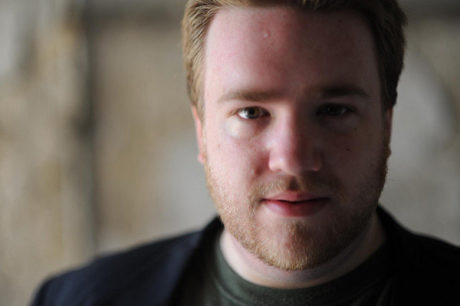
I know you did a lot of research on the subject. Is the true story told exclusively in Dahmer’s own words, or did you add additional invented material?
Josh: About 98% of the script is his own words, taken directly from his confession to the police and the interviews he gave after he was caught. For someone who was so secretive during the extended period of his crimes, after his arrest he felt compelled to talk. The best source I read was A Father’s Story, the book his father Lionel Dahmer wrote about him. It wasn’t sensationalized; it gave a real glimpse into the person he was. The words in the play that are mine are only used to make it a fluid narrative, not just a transcription of the quotations. But the lines that people find the most outrageous, that they think are made up, he really said.
Ryan: We spent a lot of time talking about it and were very careful to be authentic, not to change the direct quotes. To do justice to this true story, we needed to keep it accurate.
Aside from the physical resemblance, why did you think you’d be right for the role, Josh? Is there any chance of empathizing with this character?
Josh: Yes, I think both the audience and I can identify with parts of him and his background. For me, I understand what it’s like growing up gay in a rural or suburban community where it’s not talked about and you’re not sure if it’s ok. I think anyone in the audience could relate to trying to find yourself and to figure out who you are in your adolescence; it’s something we all face. This could be anyone’s story, in terms of what he goes through in his childhood and the common experience of growing pains, up until the point when he commits murder. He seems like a regular person, who then takes a dramatically dark turn. The play doesn’t glorify or excuse him in any way, but it does try to make people understand who this person really was. The court ruled that he was sane, which to me makes it even more frightening. He could be any one of us.
Ryan: Josh sees in it a lot of parallels with his own childhood, and the troubled youth many people experience, and recognizes that there are others whose lives might have turned in that same direction if they didn’t get the help or support they needed. So it’s important to him to tell it right, to capture the mindset of Dahmer – which he really does.
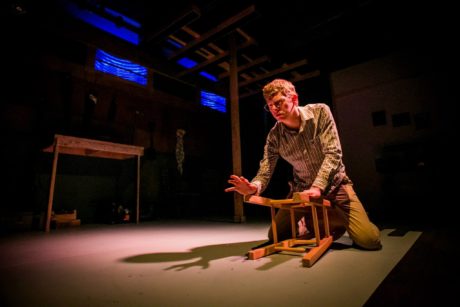
What lesson is to be learned from the play, and the true events that transpired?
Josh: For me, one of the key issues comes from the end of the statement Dahmer made at his trial, which also comes near the end of the play: “It’s just a sick, pathetic, wretched, miserable life story . . . How it can help anyone, I have no idea.” That stuck in my mind. There has to be something to be learned from this, some good to come out of it. When we know people are in pain, we don’t often ask about it, even though we can see it. So I hope people who see this performance will reach out. Jeffrey Dahmer was an alcoholic from his school days; he came to high school drunk and reeking of liquor, but no one – not the teachers or principal or guidance counselors – did anything, or tried to help him. If they had, things might have been very different.
Ryan: The main thing we want audiences to take away from the show is to be aware of the people around them and to send them love; don’t let them fall through the cracks. Someone needs to be there for them, or they will react in very unpleasant ways, as Dahmer did. The rise of social media has contributed even more to this very callous attitude in our society and the ease with which others can be attacked, under anonymity and without direct personal contact. Cyberbullying has become a serious problem, and it could result in similar dire consequences. We need not to attack people who are different, or strange, or quiet, or timid, or outsiders; we need to pay attention to them, not to cause them more pain or to push them over the edge.
This is not your first foray into the dark side. At what age did you first become attracted to the fright genre?
Josh: From the time I was very young, I always loved ghost stories and horror stories and the feeling of being scared. I went on ghost tours with my family on vacations, then led them as an adult, and the most memorable experiences I’ve had in the theater have been the frightening ones. It’s like a rollercoaster ride; you’re afraid while you’re on it, but you come out of it feeling alive and exhilarated. Not a lot of this kind of work is done in Philadelphia, so it’s a gap I’m hoping to fill. I’ve done many solo shows of classics like Bram Stoker’s Dracula (which I’ll be performing again at The Rosenbach in October) and Mary Shelley’s Frankenstein (presented at the Mütter Museum), and I also started my own indie theater company, Going Dark, so that I could present both the classics and new works of horror.
Ryan: I was never attracted to the horror genre per se, but in college I was interested in Antonin Artaud’s Theatre of Cruelty. The concept is that people don’t see violence for what it is, so need to be shocked into seeing it. I was also very inspired by Augusto Boal and his Theatre of the Oppressed. He traveled to villages in his native Brazil, Africa, and around the world, and worked with community members to create plays about the issues in their own community. He had very positive healing effects.in promoting social justice, education, and political change. With Dahmer, I’m interested in ways to make the issues raised by his story relevant to our community and to speak to them,
What are some of the works in literature, theater, or film, that most inspired you to specialize in thrillers?
Josh: Wow, that’s a great question. I think a lot of what I do is based on urban legends like “The Hook” and on my reading about true crime cases like Lizzie Borden and Jack the Ripper, because they really happened. They’ve become so much a part of our cultural consciousness, they get inside people’s heads. That’s something very powerful and interesting to me, which inspired me to create my own.
Ryan: As A kid, I always like the children’s Goosebumps series by R.L. Stine. Then in college it was Quills by Doug Wright; I played the Marquis de Sade. Josh and I talk about wanting to do that one together some day.
What are you most looking forward to in participating in the New Jersey Fringe?
Josh: I haven’t been in a Fringe festival for years, so that will be fun for me to do again. And I haven’t done Dahmer for two years now, so it’s time to bring it back, for a new audience to be exposed to our work. I love that you can buy a day-pass for the Jersey Fringe, and are able to “binge watch” theater for the three days it runs. There are some great shows by Philadelphia artists in it this year, along with some interesting local works, so I plan to see as much as I can while I’m there.
Ryan: I like the space, and I also especially like how the festival is run. The tickets are cheap, so everyone can attend, and the day passes make it even more affordable. And it’s great to return to this piece. We’ve done it three times before, and I feel like it’s getting to the point of perfection. We’ve really honed in on what we want it to be, so I’m very excited for audiences to see it.
How has your experience been with the team at the Eagle Theatre?
Josh: I loved going down to Hammonton for the site visit. It’s a beautiful town and the theater is a great; the back Warehouse Space is just right for our show. Plus they’re such nice people at the Eagle. There are a lot of things stored in the room we’re using, which they promised they’d clean up before the Fringe. But we said, “No, don’t! Don’t even sweep the floor!” It’s perfect, it looks like a basement (where our show takes place), so we’ll have the right set and mood. They were happy to hear that; they said we made their day!
Ryan: They’ve been very nice – totally willing to work with us, and they definitely gave us the perfect space for our show.
Has the new venue affected the design and blocking of the show since you first presented it in Philadelphia, or are you still able to keep it close to the audience?
Josh: The audience is very close, and the Warehouse room at the Eagle allows us to bring the show back to its bare-bones roots in the SoLow Festival, where I previously performed it, in an unconventional space.
Ryan: It changes a little every time, but, yes, this is closer to the SoLow Fest. The show isn’t on an elevated stage, it’s right on the floor with the audience, so there’s a very personal and intimate feel to it.
Do you have any new projects in mind after Dahmer that will keep our spines tingling and our hair raised?
Josh: I do! First I’ll be directing John Steinbeck’s classic The Grapes of Wrath in September at Allens Lane Art Center, but then for Halloween I’m doing The Bone House by Canadian writer Marty Chan. It’s the scariest piece of theater I’ve ever read. Actually, it’s not as much a play as an immersive experience for the audience, which asks why people are so fascinated by killers. They tend to read all about them and know their stories, but don’t know anything about the lives of the people who were lost. That one will be at The Art Church of West Philadelphia.
Ryan: I don’t have anything coming up in the horror genre, but there are rumblings that Divine/Intervention [a hit in the 2015 Philadelphia Fringe Festival and winner of an Award for Overall Excellence in FringeNYC, in which Ryan co-starred as actor Glenn Milstead] will have legs; we’ve had some interest, but we’re not ready to make the announcement just yet.
Many thanks, Josh and Ryan, for giving us an inside look at your show and its background, into the mind of Jeffrey Dahmer, and into the urgent need to be aware, and to help others, while we still can.
The Confession of Jeffrey Dahmer plays Friday, August 4, through Sunday, August 6, 2017, at Going Dark Theatre, performing at the Eagle Theatre Warehouse Space – 208 Vine Street (back entrance), Hammonton, NJ. For more information, contact [email protected].



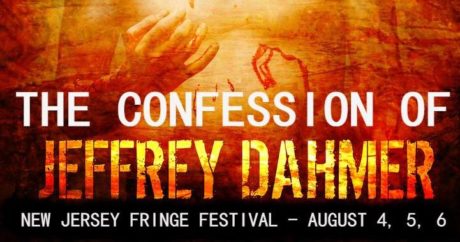



My husband and I were at Fringe in Hammonton this weekend and this act stood out!!!! He was amazing!
Linda & Jim